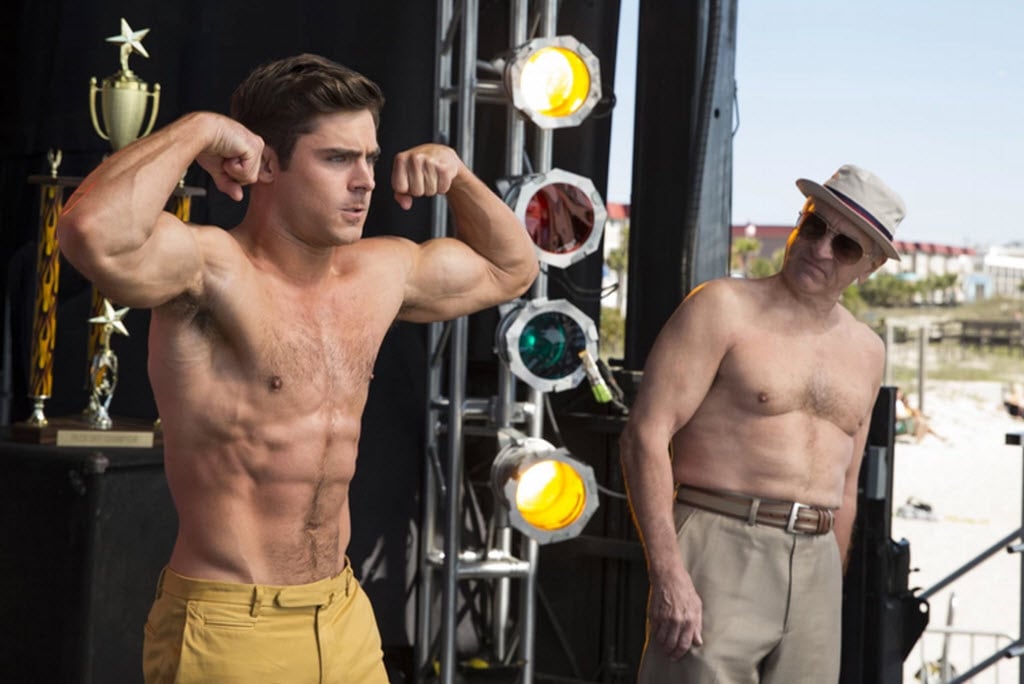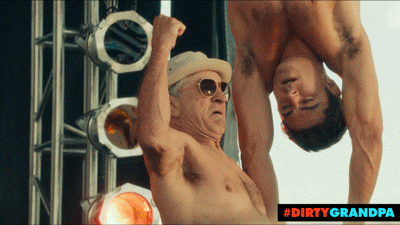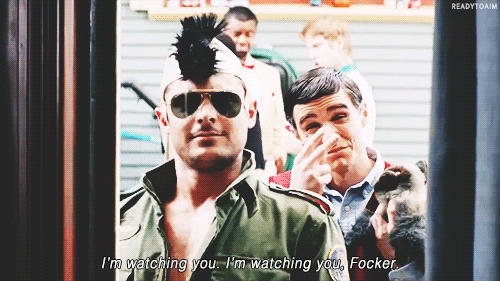‘Dirty Grandpa’ Review: When Did Comedy Become A Grim Dystopia Of Bros Partying Until They Die?
Can we really blame Robert De Niro for Judd Apatow's mistakes?

I believe very few films are a genuine waste of time. Even the biggest turkey is worth discussing. But Dirty Grandpa really challenged me. It isn’t just clichéd and lowbrow — it’s also mean, incoherent and pointless. It’s the sort of film that makes you feel really flat whenever you remember bits of it.

What.
Despite itself — because nothing that director Dan Mazer intends to do actually works — Dirty Grandpa is a kind of magic mirror in which everything looks awful, like the troll mirror in Hans Christian Andersen’s The Snow Queen. It reflects that the extended kidulthood we think we desire is actually an embarrassment at best, and a nightmare at worst.
–
Old-Age Kidulthood And The Curse Of Judd Apatow
The idea of Dick Kelly (Robert De Niro) being a horny senior citizen is allegedly funny because in our culture those two things aren’t meant to go together — much as young people aren’t supposed to be as prim and conservative as Dick’s buttoned-down lawyer grandson, Jason (Zac Efron). Because of this, when Jason’s persuaded to drive his recently-widowed grandpa from Atlanta to Boca Raton to play golf, of course they end up partying at Spring Break in Daytona instead.
From Freaky Friday (1977) to Big (1988), major Hollywood releases have often mined humour from characters of contrasting ages swapping bodies, tastes and social situations (2009’s 17 Again even starred Efron). Other stories, including 21 Jump Street (2012) and Never Been Kissed (1999), involve adults who try to pass as teenagers.

But in its modern incarnation, the ‘kidulthood‘ movie revolves around partying and emotional bonding fueled by alcohol and drugs — provided here by a genial dealer named Pam (Jason Mantzoukas). Its comedic motifs are penises, bodily functions, gay panic and pop culture in-jokes. Its female characters are cool and hilarious if they’re wasted and down to fuck, like Lenore (Aubrey Plaza) the co-ed who sets her sights on Dick. If not, they’re buzz-killing shrews like Jason’s uptight, micromanaging fiancée, Meredith (Julianne Hough).
The man directly responsible for this particular travesty isn’t even part of its ostensible creative team. It’s Judd Apatow, who once vowed to put a dick in every one of his movies. Apatow’s influence on kidult humour is immense. As executive producer of Paul Feig’s cult TV show Freaks and Geeks, he helped discover kidult princes Seth Rogen, James Franco, Jason Segel and Martin Starr. He produced Adam McKay’s films and nurtured kidult directors and writers including Evan Goldberg (Superbad, Pineapple Express), and Jake Kasdan (Sex Tape, Bad Teacher). And of course, he also directed seminal kidult texts, from The 40-Year-Old Virgin to Trainwreck.
And the problem with this Apatovian approach is that its scripting is really weak. It substitutes repetition (“I smoked crack? I SMOKED CRACK!”) and improvised riffing for dialogue, ‘gross-out’ moments for comedic setups, and endless, tiresome pop-cultural references in place of punchlines. What teenager seeing this movie is going to get a joke in which an old man calls a black street gang “Jodeci”? And, for that matter, what old man would even think to make jokes about a minor ’90s R&B group?
While the modern kidulthood film may flirt with the horrors of ageing (Old School, This Is 40), it equates sobriety and dignity with pathetic emasculation. (Dick insults Jason by repeatedly telling him he’s a vagina.) So of course it’s going to advocate a grim dystopia in which bros party until they die. The only way this film depicts being ‘too old for this shit’ is Danny Glover sitting in a nursing home attached to an oxygen tank, working on pornographic embroidery.
The kidult film’s obsession with body humour basically only reveals our culture’s fear of real, adult bodies and sexuality. Dirty Grandpa tries to mine gags from things that aren’t even that dirty, like a septuagenarian masturbating or being naked. And while we see plenty of Efron’s ripped Ken doll-like torso, you can’t help but imagine a sexless mound beneath his furry G-string. Even the supposedly sexually aggressive Plaza looks like she’s fighting the effects of a roofie the whole time.
–
You Care More About Robert De Niro’s ‘Legacy’ Than He Does
Because Dirty Grandpa is so aggressively bad, and represents Robert De Niro’s latest low-prestige comedic role in a late-career streak that includes Last Vegas, The Big Wedding and Everybody’s Fine, a lot of fretful talk has centred on the notion that De Niro is ‘tarnishing his legacy’.
By ‘legacy’, people usually mean De Niro’s frequent collaborations with Martin Scorsese, or his other dramatic roles in films such as Once Upon A Time In America (1984), The Mission (1986), The Untouchables (1987), Cape Fear (1991) and Heat (1995). But De Niro has been taking the piss out of his tough-guy-and-psychopath typecasting since We’re No Angels (1989), and he’s also tried roles as diverse as Meryl Streep’s star-crossed lover (Falling in Love) and a monster created by Kenneth Branagh (Mary Shelley’s Frankenstein).
Let’s face it, to anyone under 25, Robert De Niro probably is best known for Meet The Parents.

I’m happy to defend De Niro’s late work. I really liked him as a lumpen petty crim in Jackie Brown, as a beleaguered movie producer in What Just Happened and especially as a gentle, pragmatic retiree in The Intern. He still brings charisma to every role. I like that De Niro was adventurous enough to give Dirty Grandpa a go. Palling around with your fellow old actors in Last Vegas is one thing; it’s another to take the piss out of your pretty-boy co-star, and spout the kind of unrelenting filth that Travis Bickle saved for his mirror.
As BuzzFeed’s Anne Helen Peterson astutely observes, “There’s an argument that De Niro should survey the offerings around him, dub them unworthy, and recede into the shadows of Hollywood memory like some noble grandfather. But that’s film snobbery at best and thinly veiled ageism at worst.” Indeed, if we’re to concern-troll an actor in Dirty Grandpa, it should probably be Zac Efron, who came to this film off box-office bombs We Are Your Friends and That Awkward Moment.
Robert De Niro has no financial troubles like Nicolas Cage, or contractual obligations to roles he hates. And embarrassing flops can happen to anyone. What if De Niro just really enjoys acting, and wants to try as many different flavours of it as he can? If you want to critique the exploitation of a hapless former star, look at Mickey Rooney’s disturbing final years. That’s actual Hollywood elder abuse.
The whole idea of an actor’s ‘legacy’ is a fan construct. It mainly expresses the ideals of taste we want to express when we talk about ‘a Robert De Niro film’, and our annoyance that the actual actor is rendering this construct incoherent through doing terrible movies. In this case, Dirty Grandpa plays into the fans’ hands by legitimately being one of the worst films of 2016. But that’s not De Niro’s fault. It’s the fault of our seriously weird social attitudes surrounding age and hedonism — and the kidult-industrial complex that creates a market for juvenile, poorly-crafted comedy.
Perhaps we could see Dirty Grandpa as an accidental multiplex companion piece to Youth, Paolo Sorrentino’s recent arthouse meditation on creative legacies. In that film, Paul Dano plays a young actor afraid of being typecast for dumb comedy roles; Michael Caine is a composer who retreats from the world, as we seem to want stars like De Niro to do; and Harvey Keitel plays an old Hollywood rogue who just wants to keep creating, even though his films all bomb these days. They’re all fully realised human beings with dignity and desires — and humanity is something Dirty Grandpa woefully fails to convey.
–
Dirty Grandpa is in cinemas now.
–
Mel Campbell is a freelance journalist and cultural critic. She blogs on style, history and culture at Footpath Zeitgeist and tweets at@incrediblemelk.